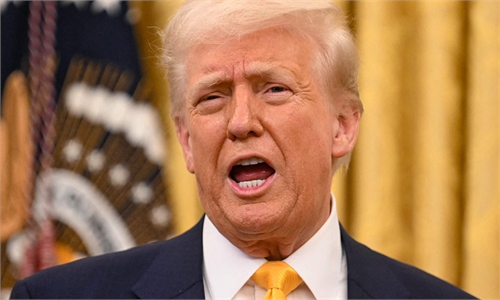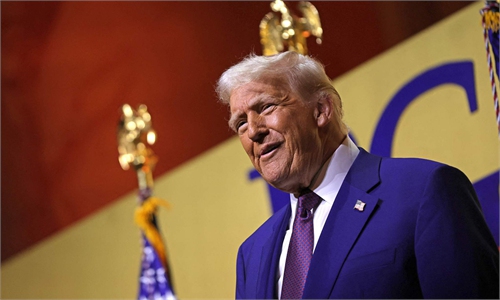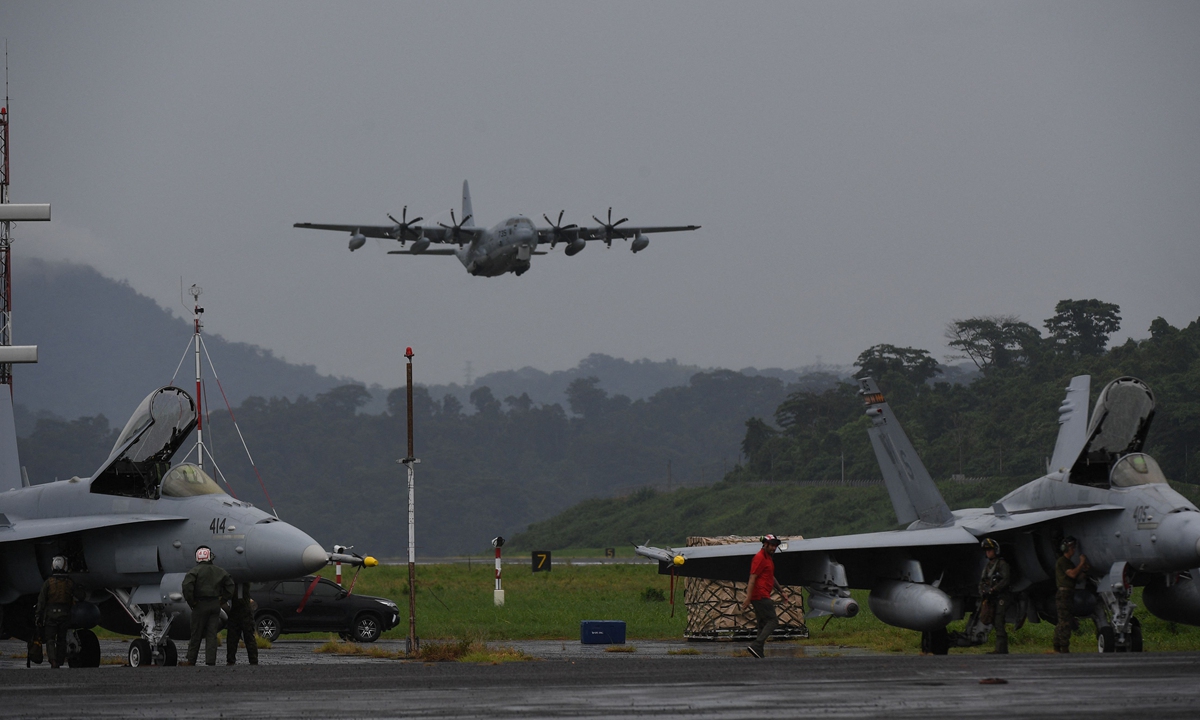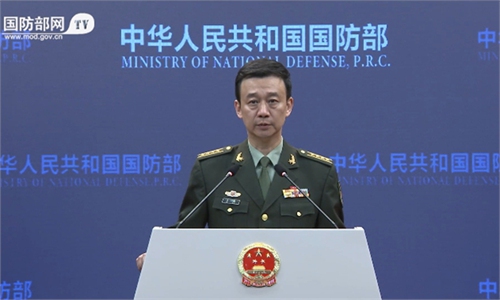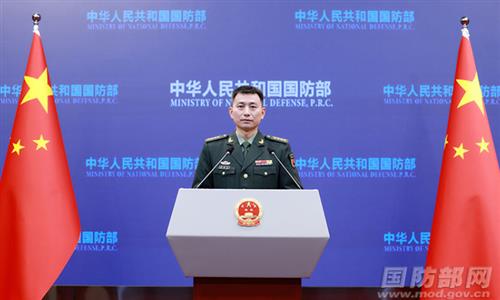Picture shows the US Agency for International Development (USAID) headquarters in Washington, DC, the US, on February 3, 2025. Photo: VCG
In the first installment of the Global Times' new series to outline the history, the funding chains, and complex controversies behind the US Agency for International Development (USAID), we analyzed what purposes the agency serves for the US, and how it has gradually evolved into a large entity with over 10,000 employees worldwide.
In the second installment of the series, we aim to uncover how USAID has used foreign aid for more than half a century to carry out ideological infiltration and so-called "democratic reforms" in developing countries, thereby serving the geopolitical interests of the US.
As the wrestling over the USAID is still ongoing, several Chinese experts reached by the Global Times agreed that the agency may undergo significant changes in its organizational structure and functions, but the political role it plays and the US government's practices of interference and penetration in other countries are unlikely to cease.
Development is the eternal pursuit of human society. Foreign aid should be an important resource for addressing global development challenges, yet it is viewed by the US as a tool to maintain its hegemonic position and engage in geopolitical maneuvering. Agencies and organizations like the USAID are "white gloves" for this selfish and hypocritical approach, according to two reports by the Chinese Foreign Ministry published in 2024 on the US foreign aid.
The problems that the US has accumulated in its foreign aid efforts will ultimately harm the country itself, experts noted.
No free lunch
The USAID is the main foreign aid agency of the US, but, notably, the "humanitarian aid" or "development aid" it claims to provide is mostly accompanied by political preconditions that align with American values.
According to a report by the Chinese Foreign Ministry published in April 2024 titled The Hypocrisy and Facts of the United States Foreign Aid, from the 1970s to the 1980s, US aid to developing countries was based on the premise that recipient countries would undergo marketization and privatization structural adjustments to achieve economic goals.
The USAID has publicly formulated a policy in this regard, requiring recipient countries to use aid mainly for the development of private enterprises and not for public investment. Such unilateral aid by the US was difficult to meld with local circumstances and affected the ecology and endogenous driving force of sustainable economic development of recipient countries and increased their debt burden, according to the report.
A Global Times reporter had studied conflict prevention and peacebuilding at Durham University in the UK from 2014 to 2015. USAID is one of the main future employment paths for students in this program, especially for those from the US.
Based on the reporter's observation, compared to other organizations relevant to the course, USAID shows more pronounced characteristics of hegemonism and interventionism as it places greater emphasis on supporting the US' "agents" in other countries through aid to expand US influence and interests in the recipient regions, while also exporting American values and ideologies in the process.
The course provides an opportunity to observe what the potential "talent pool" for USAID looks like. From the reporter's observations, a part of American students in the class were pragmatic "defenders of American interests." They held distinct positions and made value judgments based on American and Western interests or ideologies regarding conflicts, taking sides accordingly and discussing specific aid proposals based on that foundation.
They firmly believed that this could improve human rights conditions in the relevant countries and regions, as they perceived American ideology and values to represent the direction in which civilization and humanity should progress. Therefore, in their view, aid recipients that align with American values are deemed worthy of assistance. Even in conflict zones or areas that have long lacked education and basic human rights protections, they prioritize supporting local "pro-Western progressive forces" to seize power, even if this could worsen human rights conditions, the Global Times reporter found.
USAID's ideological infiltration and interference in the internal affairs of other countries has been criticized and publicly condemned by multiple nations.
"What we have learned about it now suggests that it was an agency for interfering in the internal affairs of other states and changing the regimes in many countries," Russian Foreign Ministry spokesperson Maria Zakharova commented at a press conference on February 6, according to the website of the Russian Foreign Ministry.
On February 9, a protest against mining organized by the opposition took place in El Salvador. El Salvador's President Nayib Bukele subsequently responded to the protest on X and said "It's clear there is no opposition without USAID money."
In a previous post on February 2 on X, he said "Most governments don't want USAID funds flowing into their countries because they understand where much of that money actually ends up. While marketed as support for development, democracy, and human rights, the majority of these funds are funneled into opposition groups, NGOs with political agendas, and destabilizing movements."
"Many projects of the in USAID are aimed at cultivating so-called 'civil forces' or 'opinion leaders,' and through these aid recipients, they foster dissatisfaction and division in local societies, without making real improvements in local conditions," said Lü Xiang, an expert at the Chinese Academy of Social Sciences.
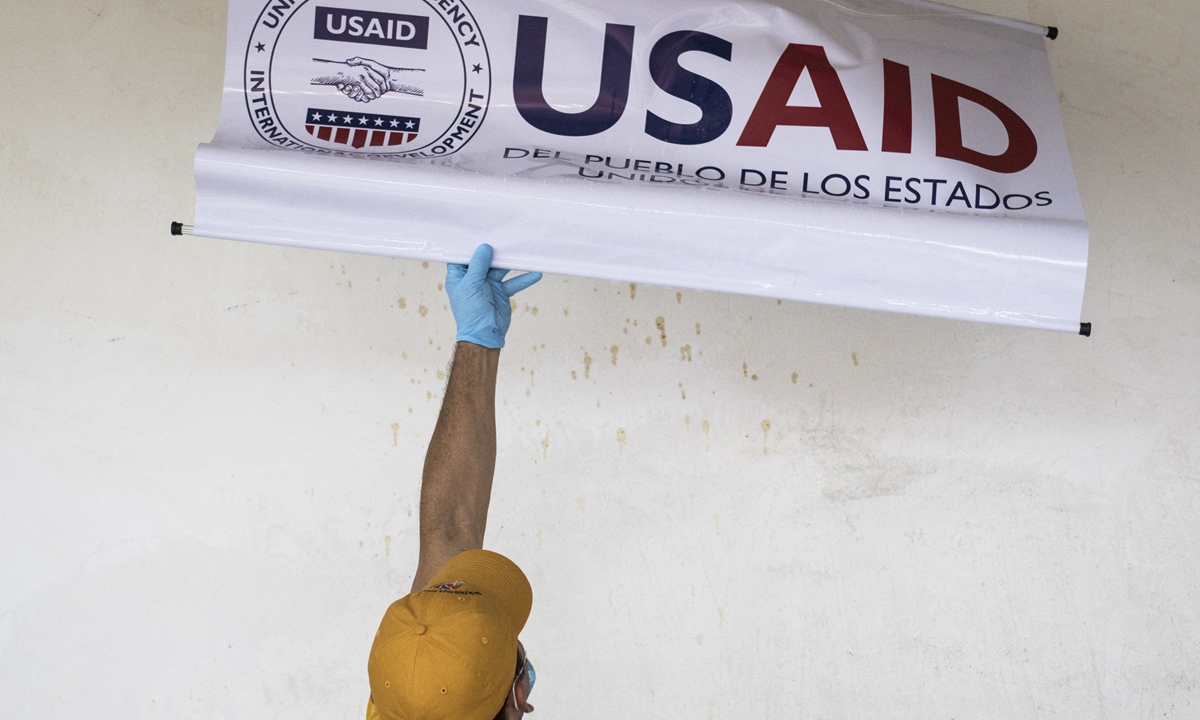
A staff is taking off a sign of the USAID in a community in Cucuta, Colombia, on February 9, 2019. Photo: AFP
Despicable acts targeting China
As an infamous "white glove" of the US government, USAID had also repeatedly exploited its resources and influence to interfere in China's internal affairs, undermine stability in some regions in the country, tarnish China's image, and incite hostility toward China in the international community. The so-called lofty slogans of "democracy" and "human rights" that USAID promotes cannot conceal its despicable intentions to suppress and split China.
Earlier this month, the Hong Kong Public Opinion Research Institute (HKPORI), a USAID-backed separatist group, stated on its website that it "will suspend all its self-funded research activities indefinitely." Many believed the suspension was directly linked to the closure of USAID, which had been funding this group to undermine the national security law for Hong Kong and the Chinese central government.
Chung Kim-wah, former deputy executive director of the HKPORI who moved to the UK in 2022, was one of the six wanted overseas-based activists named by Hong Kong police last month for allegedly contravening the national security law.
USAID had also been found to provide long-term support to anti-China separatist organizations globally, continuously engaging in China's internal affairs concerning regions like Xinjiang, Xizang, Hong Kong and the island of Taiwan, through these organizations.
The Swiss Better Cotton Initiative (BCI), for instance, in 2021 announced the suspension of projects related to Xinjiang cotton, against the backdrop of the "forced labor" smear campaign against Xinjiang cotton by US-led Western media outlets. USAID is a major funding partner of the BCI.
In this context, it's hard to say there's no connection between BCI's claims about Xinjiang and USAID, some observers said.
Similar conditions happen on the island of Taiwan. A February 17 editorial by Taiwan media China Times stated that, several NGOs on the island of Taiwan that support separatist Democratic Progressive Party had indirectly received financial support from USAID.
In recent years, as initiatives like the Belt and Road Initiative (BRI) have benefited an increasing number of countries and regions worldwide, China's growing international influence has become a target of resentment for the US. Funding both domestic and overseas groups to undermine China's cooperative projects abroad and damaging its international image has therefore become a primary task for the US' "white glove" agents including USAID. In November 2023, for instance, a research lab at US-based William & Mary's Global Research Institute named AidData released a report slandering the BRI. AidData's website shows USAID as is its major partner and funder.
In Serbia, USAID had been accused of infiltrating local anti-government protests, and had repeatedly engaged in promoting rumors targeting local Chinese-invested projects. The "carcinogenic Chinese-owned steel company" rumor in late 2021 was a typical example, fabricated by a Serbian NGO Tvrdjava ("Fortress") backed by USAID.
A Reuters report in November 2021 cited data obtained by Tvrdjava, alleging that Smederevo Steelworks in central Serbia caused a great amount of pollution and even increased "cancer cases," after being purchased by China's HeSteel Group (HBIS) in 2016. Chinese media outlets later refuted the claim with solid data.
Inglorious chain of funds
According to a February 7 article by US think tank Council on Foreign Relations (CFR), USAID is funded by the US Congress, which allocates money for it through the State, foreign operations, and related programs appropriations each fiscal year.
Data from the CFR and US government showed that the US disbursed close to $72 billion in foreign assistance worldwide in fiscal year 2023, nearly 61 percent of which was distributed through USAID.
Nonetheless, the vast majority of USAID's substantial funding might not actually reach those in need. US Representative Brian Mast said to Columbia Broadcasting System (CBS) on February that when it comes to USAID funding, only "10 to 30 cents on the dollar is what actually goes to aid." Earlier, a January USAID report recapping 2024 stated that, about 12.1 percent of all USAID funding goes directly to local organizations in foreign countries, including NGOs, the private sector, and government partners. More of its expenditures were reportedly spent back in the US.
USAID was also found to have been largely engaged in many misinformation campaigns targeting the US' "rivals," diverting substantial funds, which could have been used to develop economies and improve lives in areas of need, toward despicable cognitive warfare tactics.
In September 2024, US Congress authorized appropriations for "Countering the People's Republic of China Malign Influence Fund," which planned to appropriate $325 million for each of the fiscal years between 2023 and 2027 - $1.625 billion in total - to counter the so-called maligning influence of China. In other words, to counter any aspects that the US perceives as unfavorable from China.
The Congress didn't explicitly say who would operate the massive fund of $1.6 billion, but USAID were found behind the scene. Act H.R. 1157, which Congress passed to authorize the money, directly mentioned that the administrator of USAID must designate a senior official as the "assistant coordinator" of the program.
Many actions to badmouth China might have been carried out globally under such programs. In September 2021, for instance, Zimbabwe's largest daily newspaper, The Herald, revealed that the US was funding and training local reporters to write anti-China stories and discredit Chinese investments, Xinhua reported in October that year.
Facing doubts and challenges, the future direction of USAID is filled with uncertainty. Experts reached by the Global Times said that the USAID may undergo significant changes in both its organizational structure and functional roles in the future. However, the US government's need for political influence abroad still exists, experts warned.
The overall scale of USAID is expected to be significantly reduced and some of USAID's functions, including those with political objectives, may still be retained in another form in the future. The agency may work more closely with external propaganda and foreign political relations, such as collaborating with US embassies and other institutions abroad, Lü said.
Song Guoyou, an expert at Fudan University, believes that the likelihood of USAID being completely dismantled during Donald Trump's presidency is low, but it will inevitably undergo major institutional adjustments, project adjustments, and shifts in aid direction.
Song predicted that the adjustments may lead USAID to stop those activities that are "both wasteful and harmful." But actions that are "detrimental to other countries but beneficial to the US" will continue by the USAID or any other potential agencies.
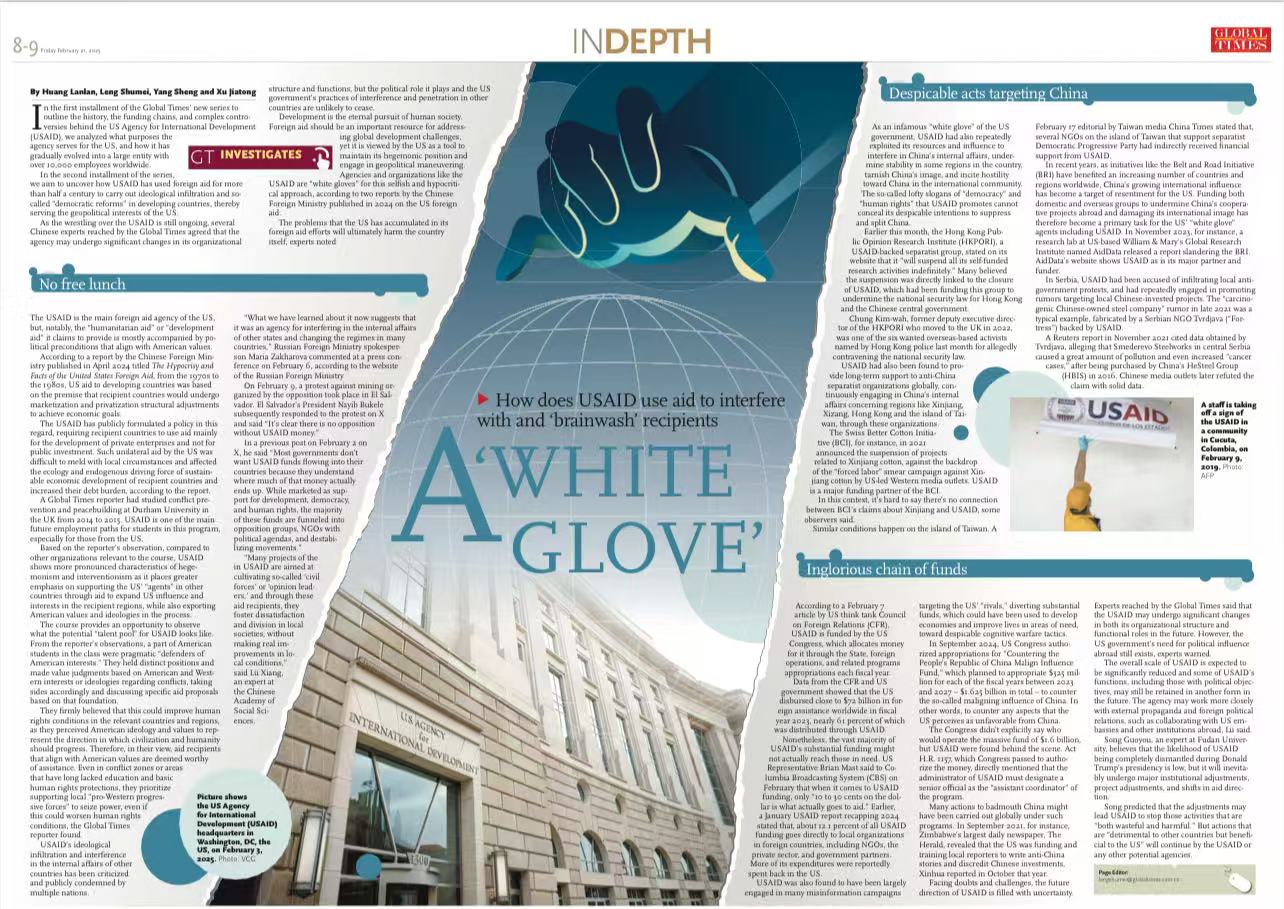
A 'white glove'
Related:
U.S. President Donald Trump on Friday depicted Ukrainian President Volodymyr Zelensky's presence at peace talks as "not very important."
Major research universities and hospitals across the United States are bracing for devastating funding cuts under new Trump administration policies that threaten to disrupt critical medical research and scientific progress.

%20headquarters%20in%20Washington,%20DC.jpeg)



